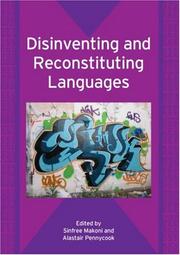| Listing 1 - 2 of 2 |
Sort by
|


ISBN: 9781853599248 1853599247 9781853599231 1853599239 9781853599255 1853599255 1280705388 9786610705382 Year: 2006 Publisher: Bristol Blue Ridge Summit
Abstract | Keywords | Export | Availability | Bookmark
 Loading...
Loading...Choose an application
- Reference Manager
- EndNote
- RefWorks (Direct export to RefWorks)
This book questions assumptions about the nature of language and how language is conceptualized. Looking at diverse contexts from sign languages in Indonesia to literacy practices in Brazil, from hip-hop in the US to education in Bosnia and Herzegovina, this book forcefully argues that a critique of common linguistic and metalinguistic suppositions is not only a conceptual but also a sociopolitical necessity. Just as many notions of language are highly suspect, so too are many related concepts premised on a notion of discrete languages, such as language rights, mother tongues, multilingualism, or code-switching. Definitions of language in language policies, education and assessment have material and often harmful consequences for people. Unless we actively engage with the history of invention of languages in order to radically change and reconstitute the ways in which languages are taught and conceptualized, language studies will not be able to improve the social welfare of language users.
Sociolinguistics --- Language and languages. --- Langage et langues --- Semantics. --- Formal semantics --- Semasiology --- Semiology (Semantics) --- Foreign languages --- Languages --- Comparative linguistics --- Information theory --- Language and languages --- Lexicology --- Meaning (Psychology) --- Anthropology --- Communication --- Ethnology --- Philology --- Linguistics --- language policy. --- languages. --- linguistics.


ISBN: 9781853599255 9781853599248 Year: 2006 Publisher: Bristol ;; Blue Ridge Summit Multilingual Matters
Abstract | Keywords | Export | Availability | Bookmark
 Loading...
Loading...Choose an application
- Reference Manager
- EndNote
- RefWorks (Direct export to RefWorks)
| Listing 1 - 2 of 2 |
Sort by
|

 Search
Search Feedback
Feedback About UniCat
About UniCat  Help
Help News
News